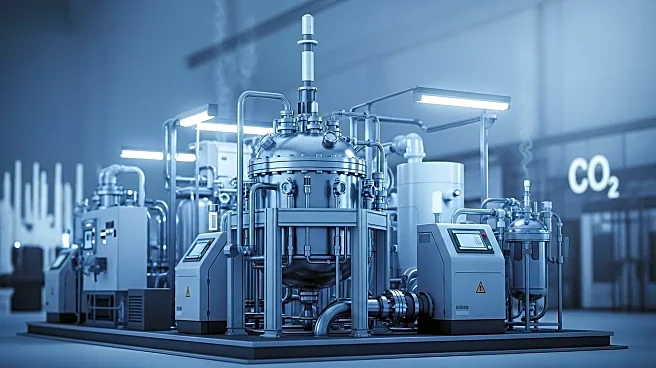What is the story about?
What's Happening?
The ConsenCUS project, a collaboration of 19 industrial and academic partners, has successfully demonstrated the feasibility of electrochemical CO2 capture technology in industrial settings. This innovation aims to support Europe's goal of achieving net-zero emissions by 2050. The project utilized electricity-based capture and conversion processes, which are easier to decarbonize compared to traditional heat-powered methods. Demonstration modules were tested at various industrial sites, including a cement plant in Denmark and a refinery in Romania, proving capable of handling diverse flue gas compositions. The captured CO2 was converted into potassium formate, a biodegradable product with significant market potential.
Why It's Important?
The successful demonstration of electrochemical CO2 capture technology marks a significant step towards sustainable industrial practices. By reducing the energy consumption associated with carbon capture, this technology offers a viable path to achieving net-zero emissions. The ability to convert captured CO2 into valuable products like potassium formate further enhances its economic viability, potentially transforming industrial carbon management. This innovation supports the EU's climate goals and could lead to widespread adoption of similar technologies, driving progress in global efforts to mitigate climate change.
What's Next?
As the ConsenCUS project concludes, the consortium will focus on scaling up the technology for commercial use. This involves optimizing logistics for CO2 transport and storage, ensuring safety and efficiency in the process. The project's findings will inform future policy recommendations for industrial carbon management, advocating for accelerated deployment of CCU/S technologies. Continued collaboration with local communities and governments will be essential to integrate these solutions into existing energy systems and achieve full-scale implementation.
Beyond the Headlines
The project's emphasis on community engagement highlights the importance of public awareness and acceptance in the deployment of CCU/S technologies. Addressing environmental concerns and ensuring transparent communication are crucial for gaining support from local stakeholders. Additionally, the project's success underscores the potential for electrochemical processes to revolutionize carbon capture, offering a sustainable alternative to conventional methods. This could lead to broader applications in other sectors, further advancing efforts to combat climate change.















